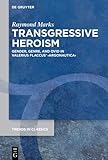Transgressive Heroism : Gender, Genre, and Ovid in Valerius Flaccus’ ›Argonautica‹ / Raymond David Marks.
Material type: TextSeries: Trends in Classics - Supplementary Volumes ; 175Publisher: Berlin ; Boston : De Gruyter, [2024]Copyright date: 2024Description: 1 online resource (VIII, 290 p.)Content type:
TextSeries: Trends in Classics - Supplementary Volumes ; 175Publisher: Berlin ; Boston : De Gruyter, [2024]Copyright date: 2024Description: 1 online resource (VIII, 290 p.)Content type: - 9783111562544
- 9783111562742
- 9783111562629
- 930
- online - DeGruyter
- Issued also in print.
| Item type | Current library | Call number | URL | Status | Notes | Barcode | |
|---|---|---|---|---|---|---|---|
 eBook
eBook
|
Biblioteca "Angelicum" Pont. Univ. S.Tommaso d'Aquino Nuvola online | online - DeGruyter (Browse shelf(Opens below)) | Online access | Not for loan (Accesso limitato) | Accesso per gli utenti autorizzati / Access for authorized users | (dgr)9783111562629 |
Frontmatter -- Acknowledgments -- Contents -- 1 Introduction -- Part I: Reframing Heroism -- 2 Hercules -- 3 Cyzicus -- Part II: Transformations and Transgressions -- 4 Artes Amatoriae -- 5 Crossing Boundaries -- 6 Entanglements in the Grove -- 7 Deviant Desires -- Part III: Shifting Heroics -- 8 The Bulls and the Earthborns -- 9 The Fleece and a Wedding -- 10 Jason’s Heroic Crisis -- 11 Conclusion -- Bibliography -- Index Locorum -- Index Nominum
restricted access online access with authorization star
http://purl.org/coar/access_right/c_16ec
Roman epic is traditionally understood to advance a masculine, martial form of heroism. In his version of the Argonaut legend, the Argonautica, however, Valerius Flaccus challenges that prevailing ethos of the genre by turning Medea, Jason’s love interest in the story, into a heroic figure and Jason himself into her emasculated victim. The present study charts this plotline as it unfolds in the second half of Valerius’ epic, finding its key source of inspiration in the poetry of Ovid with its tales of transgressive love, gender-bending, and unconventional heroism. Employing an extensive program of allusion to his Metamorphoses and elegiac works, Valerius transforms Medea from the innocent, vulnerable girl we see in her first appearance in the poem into a threatening, powerful, and masculine figure, who not only helps Jason fulfill his quest for the golden fleece, but eclipses him as hero in the process. Readers of this study will gain insight into Valerius’ inventive reworking of the Argonaut myth and innovations within the epic genre as well as a greater appreciation for Ovid’s influence on Roman epic poetry in the first century CE.
Issued also in print.
Mode of access: Internet via World Wide Web.
In English.
Description based on online resource; title from PDF title page (publisher's Web site, viewed 20. Nov 2024)


